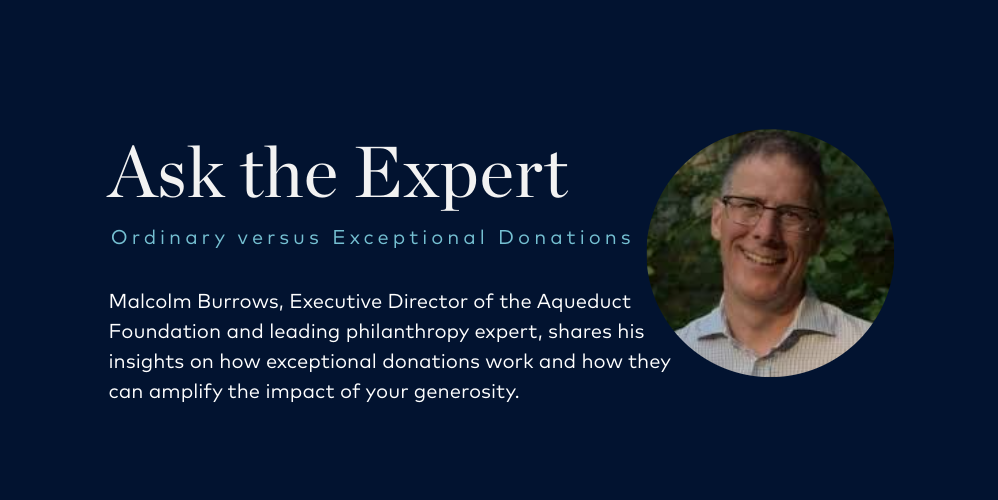The holiday season is a time for gratitude and giving, when many of us reflect on how we can support the causes closest to our hearts. Most people are familiar with ordinary donations—those heartfelt gifts made from income to support causes we care about. But for affluent families and entrepreneurs, there’s an opportunity to elevate giving to a new level through exceptional donations. These larger, strategic gifts are made from accumulated wealth, offering the chance to create a meaningful legacy while enjoying significant financial and tax benefits. To help us understand the transition from ordinary to exceptional giving, we turn to Malcolm Burrows, Executive Director of the Aqueduct Foundation, and a leading expert in philanthropy, who shares his insights into how exceptional donations work and how they can amplify the impact of your generosity.
___
Most Canadians make annual donations to charity, but not all donations are alike. There is a difference between ordinary and exceptional donations, and it’s helpful to understand how to approach each type.
Charitable donations are made online, at the office, to places of worship, in response to a telemarketer, mail or social media appeal, or through a special event. This kind of “ordinary” giving is widespread, and so it creates a feeling of comfortable familiarity.
However, this familiarity can be misleading. It’s easy to think we “know” charitable giving, only to find out that different ways of giving and structures are required. Moreover, the habit of ordinary giving obscures the increasing prevalence, complexity, and importance of exceptional donations. Understanding this rarer type of donation—the exceptional—is key to planning a gift from your accumulated wealth.
Ordinary Donations
Ordinary donations are made from income or cash flow. Anyone can make an ordinary donation at any age or income level. Although the motivation may be highly personal and provide significant help to a charity, ordinary donations are made every day.
Ordinary donations are typically made by cash, cheque, or credit card. They happen because:
- Someone asks you to give.
- An emergency, social issue, or news story sparks interest.
- You are involved with the charity.
Ordinary donations are from the heart. They are motivated by a belief in a cause or organization and are often triggered by a solicitation. Whether the solicitation is from a charity, peer, or friend, it comes with some social expectations.
Tax is rarely a motivator of ordinary donations. Donations to registered charities are eligible for a tax receipt equal to the value of the gift, but most donors have no idea how much they will save at the time the gift is made. For the record, a donation can produce a tax credit equal to 20% to 54% of the donation, depending on the taxpayer’s total annual donations, income, and province/territory. Tax savings are a nice bonus, but due to the smaller amounts and spontaneous nature of these donations, they aren’t a major consideration.
Exceptional Donations
Exceptional donations, as the name implies, are unusual. This is because they are made from wealth, not income. Or, to put it another way, these are gifts that are funded by what we live on and live in.
Everything is different with exceptional donations: the thinking, the scale, the planning, the timetable, and the social impact. Exceptional donors are likely to be aged 50+, have accumulated some assets, an altruistic spirit, and, often, have no children.
Individuals considering an exceptional gift from assets will face several factors that don’t apply to ordinary gifts. These factors include:
- Personal motivation. Exceptional donations start with donors reflecting on their life and circumstances, not with a fundraising solicitation.
- A catalytic life event. Examples include a major asset sale, such as business or real estate, which creates a large tax event. Or it could be a consideration of one’s estate and beneficiaries.
- Ensuring sufficient assets for lifestyle. As donations are irrevocable, financial planning is essential to ensure enough money to support one’s lifestyle and family.
- Donating an appropriate amount. Due to the higher value of exceptional gifts, the donor often has multiple charitable interests. These interests or charities may not be well articulated or developed at the time of the initial gift. And, the value of a gift may be too much to give all at one time, or to one charity.
- Attractive tax benefits. Canada has one of the best tax regimes in the world to encourage donations from wealth. An example is a donation of appreciated public securities. When you donate public securities, you will receive two tax savings: a tax credit or deduction and no capital gains tax. This increases the total tax savings.
- Donor Advised Fund. Donor advised funds are offered by over 150 Canadian registered charities. They are a personal charitable fund that can receive exceptional donations and provide the donor with flexibility to decide which charities to support in the future. They also help facilitate family philanthropy and may be a destination for estate donations, such as charitable life insurance and gifts by will. Aqueduct Foundation is a leader in donor advised funds in Canada.
Making the transition from ordinary donations to exceptional donations means making a mental adjustment. You need to integrate tax, financial and estate planning with your giving. You need to think more long-term and strategically. And it may be helpful to use a structure like a donor advised fund to integrate all the elements. The goal is to increase the impact of your giving in the community. The very significant side benefit is more joy and satisfaction from the process of giving.
Malcolm Burrows
Executive Director, Aqueduct Foundation


